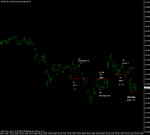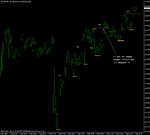At the risk of derailing this thread, although I hope what I am about to say / ask may be extremely relevant given the discretionary nature of trading based solely on support and resistance, I wanted to discuss 'filtering'. This comes from a discussion I had with a trader yesterday and also from a current discussion on another thread and has got me thinking.
A long time ago I used to have aspirations of playing guitar in a rock band. For years I practiced and, without wanting to blow my own trumpet, I got quite good. Anyway, during the course of my time playing guitar, I remember reading an interview with Clapton (I think it was) who said that what denotes a good guitar solo from a bad one is not the notes that are played but the notes that aren't. As I developed as a guitarist there were many 'turning points' along the way where suddenly stuff that a few weeks / months before had seemed impossible, suddenly became second nature - be they learning a new scale through to an advanced technique etc. What I did notice, and I was very much an improvisation based (discretionary!) guitarist, was that when it came to playing live on stage the more experienced I became, the less I actually played during a set but, conversely, the better my peers felt I had become as a guitarist. I'm sure the analogy to trading is already pretty obvious.
Trading by price alone is, by its very nature, a pretty discretionary form of trading IMO. Set-ups can be learnt, levels pre-drawn etc. but, at the end of the day, it is 100% at the trader's discretion which trades to take and which ones not to. Since I started trading this way I know I have started to 'filter' even my M5 cable trades to some extent. To give an example - if cable has made a big run one day I may avoid trading her M5 the next day as I am 'expecting' there may be at least a day's worth of consolidation on the cards. Another being that, if I were trading a break of resistance I would probably look for clear air of about 15-20 up to the next resistance level to avoid a possible bounce back through my stop.
Of late I have been trading a few other pairs using M15 but essentially using the same levels, set-ups etc. that I use on cable M5. Now some of my M15 trades are working and some aren't - with the benefit of hindsight one thing I have noticed (and please don't laugh at my naivety) is that in the main the M15 trades that work tend to conform to H1 / H4 trend direction. (This is not so much the case on M5 as it is, to my mind anyway, a very different timeframe.) I have also found myself gravitating on M15 to SbR and RbS levels rather than any old support or resistance level, regardless of what timeframe it is derived from.
Anyway, to my question. All over this forum (and other forums, books etc.) there are people advocating 'taking every set-up' etc. regardless of what one may think about it, but then I read somewhere recently that instinct is a powerful tool in trading and that one shouldn't simply take every set-up as it appears. Now the question is, some trades work and some don't - even 'the best' set-up will fail, so should one, to an extent be trading on instinct / gut? Sometimes when I scan through my charts a set-up just leaps out at me and screams 'trade me' (AUDUSD from Thursday being a classic example) - should one aim to avoid any trade that doesn't provoke that thought / emotion etc.? We can couch our entry methodology in rules such as trade with the H4 trend etc. etc. but, quite often, those trades fail as well, but the trades that jump off the chart at one, which may not have quite ticked all one's rule boxes, work. Why is this? In musical terms I know that, if a song were being played in G, overlaying a guitar solo in F is going to sound terrible, so maybe there is a contextual issue in trading that my eyes are seeing but that I'm not managing to define in terms of a set of rules to hone my entry methodology. What is the best way to overcome this problem (if indeed it is a problem) - I am guessing that it is a case of analysis of trades after they have closed to look for common themes between the ones that worked and the ones that didn't. Should I actually care as I am in fact a firm believer that the set-up / entry is irrelevant and that it is how one deals with the trade once it is triggered that will define whether one is profitable or not?
I would be very grateful for any thoughts anyone has on what I've written above. Maybe I should stop thinking so much about it and just accept that I will have winners and losers just as night turns to day? I just wonder whether Clapton's take on playing guitar may not have a lot of relevance to trading.
I hope I haven't derailed the thread - to me anyway, this style of trading isn't simply a case ticking boxes and pulling the trigger. It interests me as I have seen this moment when one has a chart screaming 'trade me' alluded to a number of times by both beginners such as myself and experienced traders and wonder what it's all about.
Hope everyone has a great weekend.
Rob



